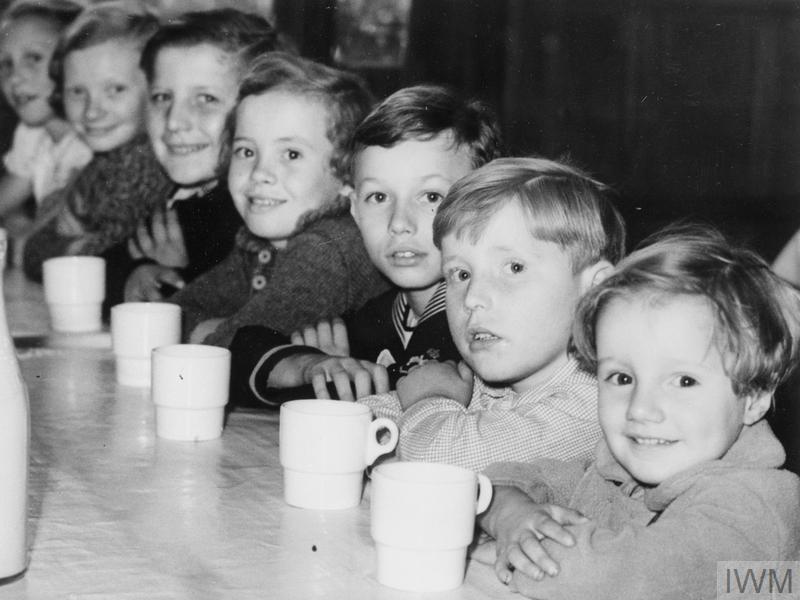Belgian refugee children waiting for their afternoon tea in London during 1940. Image from the Imperial War Museum archive.
A guest post by Dr Kate Ferguson
In the winter of 1938 the British parliament debated the question of Jewish refugees fleeing Nazi Germany. Parliament and its MPs could not know what fate awaited Europe’s Jews, indeed in 1938 the decision to implement the “Final Solution” had not yet been made. Yet by November 1938, state-sponsored targeting of Jewish communities, businesses, and individual was severe. On 9th November, on the night now known as Kristallnacht (the night of the broken glass). During the pogrom an estimated 91 Jews were killed, 30,000 arrested and 267 synagogues destroyed. Many shops and other Jewish businesses were destroyed and looted.
The violence prompted debate in Britain over the responsibility to give sanctuary to German Jews. In the shadow of that summer’s failed Evian Conference, convened by President Roosevelt to promote the emigration of Austrian and German Jewish refugees, political and public opinion was divided.
As is the case today, MPs from across the political spectrum used their platform as elected representatives to voice their concerns for Jewish refugees and to articulate British responsibility to protect those most vulnerable from further harm. As is also the case today, there were others who challenged the legitimacy of the claims to sanctuary, and who argued the plight of Jewish refugees was not a responsibility of the British government or the British people.
The following extract is taken from a House of Commons debate in November 1938 but is similar to many of more recent parliamentary debates about current refugee of migration flows.
Captain W. T. Shaw, MP for Fofar, Scotland
asked the Home Secretary whether, in view of the widespread interest taken in the question of Jewish refugees, he will arrange for the weekly publication of figures showing the number of adults and children admitted to this country?
Mr. Lloyd, MP for Birmingham Ladywood
As my right hon. Friend previously explained, there are difficulties in the way of giving figures showing the number of refugees who arrive in a given week, because amongst those who come here as visitors or students there are some who apply later to be allowed to stay as refugees, but my right hon. Friend will consider whether figures can be compiled of those who are identifiable on arrival as refugees.
Captain Shaw
asked the Home Secretary the duration of time that Jewish refugee children are to be allowed to remain in this country; and whether he will see that steps are taken to keep trace of the children and arrange for their leaving the country at a fixed age?
Mr. Lloyd
It is proposed that refugee children admitted to this country under the care of the Inter-Aid Committee for Children may be permitted to remain in this country for purely educational or training purposes until they have completed their education or training, on condition that they are not placed in ordinary employment. A record will be kept of each individual child.
House of Commons debate, 24 November 1938
Then, as now, child refugees who thought they had reached safety, lived with the threat of removal once they reached adulthood and were no longer deemed worthy of protection. Reflecting upon refugee history some things emerge familiar, others things are not. What we do know is that we have a substantial history of refugees from which current decision making could benefit.
In order to find solutions to the current challenges posed by human displacement, forced migration and refugee movement, we need to have an evidence-based conversation that draws on expertise, research and experience.
Refugee History is a site and interactive network coordinated by the University of East Anglia’s School of History, providing a platform for academic research, professional expertise and personal experience historicising issues surrounding refugees and refugeedom. Aiming at reaching out to journalists, policy-makers, lawyers, NGOs, students, activists, academics, writers and artists, it is centrally concerned with enriching and informing current debates about refugees.
Refugee History brings together network of academic and other experts to reflect upon today’s challenges from their own expert perspectives. We host a broad and multi-disciplinary directory of experts. Contributors to our blog are members of our directory or guest experts meaning that all our content is driven by evidence, expertise, and experience –rather than emotion or opinion.
Alongside its regular blogs, Refugee History operates as a dynamic forum where members can engage in informed debate, highlight new research, promote best practice, and develop new and collaborative research methods. Our members are some of the foremost thinkers and practitioners dealing with refugee issues today. They are drawn from many sectors, disciplines and parts of the world. Our directory is for public use and serves as an entry point for contacting experts working across history, refugee and migration studies. We have no political agenda and are entirely independent. We are connected solely by the desire to bring evidence, expertise and experience to current conversations around refugee and migration issues.
In the wake of President Trump’s executive orders targeting Muslims and as the British government begins the process of withdrawing the UK from Europe, Refugee History explores these political ruptures through an historical lens. This month, for example, we carry blog posts from either side of the Atlantic reflecting on what history can tell us about such seismic shifts in attitudes and policy towards migration, movement and refugees. However, our expanding network of experts provide commentary and analysis on a full spectrum of issues, across time and geography. In building an online archive drawn from research and evidence, we hope to encourage a wider, more complex conversation where the voice of the expert can be heard.
If you would like to learn more about our project please visit our website www.refugeehistory.org or contact our Editor, Dr Kate Ferguson K.Ferguson@uea.ac.uk
